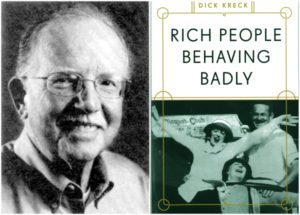ROSH HASHANAH EDITION 5777 SECTION D
This book is a collection of stories about train wrecks that have already happened, conferring upon them a darkly fascinating quality — the sure knowledge that disaster is the ultimate culmination of the tales but leaving plenty of curiosity about the tortuous roads by which that inevitable destination was reached.
As gathered and researched by former Denver Post columnist Dick Kreck, the protagonists of these stories are all Coloradans, although not all of them are necessarily rich, as the title implies. Some are better known than others; some lived to tell the tale, so to speak, while others definitely did not.
All of them, in any case, certainly behaved badly, whether motivated by anger, jealousy, greed, lust, hubris or sheer cluelessness. There are undeniable threads of tragedy woven through Kreck’s rogues gallery, as well as occasional glimpses of gallows humor.
Incredulousness, however, seems to be a key component of the reaction these stories generate, as in: How did this happen? Did they actually think they would get away with this? What in the world were they thinking?
The historical characters cover a wide and varied gamut.
There was Cortland Dines, a popular Country Club polo player and playboy who liked galavanting with Hollywood silent film flappers — and who paid for that weakness with a bullet to the chest.
There was Denver’s “flower-faced vampire,” the ravishing Gertrude Patterson who in 1911 shot her allegedly abusive husband dead in front of Montclair’s Richthofen Castle — and who, despite considerable public outrage, was acquitted of the crime.
There was Louise Sneed (Mrs. Crawford) Hill, the undisputed arbiter of Denver’s blue blood society and matron of the city’s Sacred 36 social elite — who had secrets of her own, not to mention a wicked taste for vengeance.
There was Pastor Charles Blair, evangelical preacher extraordinaire, who founded the wildly successful Cavalry Temple in Cherry Creek in the 1950s — and whose financial double-dealings nearly landed him in prison but failed to faze many of his loyal followers.
They are a colorful lot, to be sure, this strange assembly of conmen, gangsters, child-poisoners, husband-slayers and cops-turned-bad. Collectively, their stories prove that wealth, education, social status, aura of righteousness, power and beauty provide no necessary protection against the very human foibles to which our species is all too susceptible.
Jewish readers might be understandably relieved to see that no members of their community are represented here, although this reviewer recalls a prominent Jewish physician who related — still angry, decades later — how he was seriously bamboozled by one of Kreck’s subjects, Fred Ward, a crooked Hudson dealer from the 1930s who sold lots of automobiles that didn’t exist anywhere but on paper.
Kreck, drawing on his long career in journalism, brings a newsman’s skills to the task in Rich People Behaving Badly. The author of earlier books on Denver murders and crime families, he has excellent sources and personal knowledge.
He also writes objectively and skillfully, striking a fine balance between straight copy and sensationalism. To state the obvious, the subject matter here is sensational enough on its own.
For those readers who find the skeletons in our collective closet to be an irresistible temptation — whether out of a voyeuristic urge to see the grisly accident by the side of the road or a sense of schadenfreude over the downfall of the high and mighty — this is the perfect book for you.
For the rest of us — history buffs, local lore aficionados, true crime fans — it’s simply an excellent read.
Chris Leppek may be reached at [email protected].
Copyright © 2016 by the Intermountain Jewish News

















